Summary
The Israeli military and Hezbollah report ground fighting inside southern Lebanon, a day after Israel announced it was invading
The IDF says it's using "precision-guided munitions and close-range engagements" inside Lebanon
It later reports the deaths of eight Israeli soldiers in combat - the first inside Lebanon since the invasion began
Earlier, Israel's Prime Minister Benjamin Netanyahu said Iran would "pay", after Iran fired around 180 missiles at Israel on Tuesday
Lebanese officials say more than 1,000 people have been killed in the past two weeks, while around a million may now be displaced
In Gaza, the Hamas-run health ministry says Israeli strikes in Khan Younis killed at least 51 people
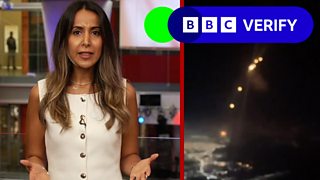
01:20 Media caption, Watch: Analysing where Iran's missiles struck in Israel
Live Reporting
Edited by Emily Atkinson, with Hugo Bachega and Nafiseh Kohnavard in Beirut and Nick Beake in northern Israel
Relief as first chartered evacuation flight from Lebanon lands in UKpublished at 21:58 British Summer Time
21:58 BST Nicky Shiller
Nicky Shiller
Reporting from BirminghamI am at Birmingham International Airport and watched the first of the flights chartered by the UK government out of Beirut land.
The Foreign Office wouldn't confirm how many people were on board, but it is a small percentage of the estimated 4,000 to 6,000 people believed to still be in Lebanon as of last week.
Those on the flight each paid £350 for a seat, with vulnerable people given priority on this first one. There will be another one tomorrow and, Foreign Secretary David Lammy says, "for as long as there is demand and it is safe to do so".
For the people who have been waiting in arrivals at the airport I am sure they will just be relieved to see their loved ones back in the UK.
Iran's attack on Israel divides opinion among Lebanon's displacedpublished at 21:48 British Summer Time
21:48 BST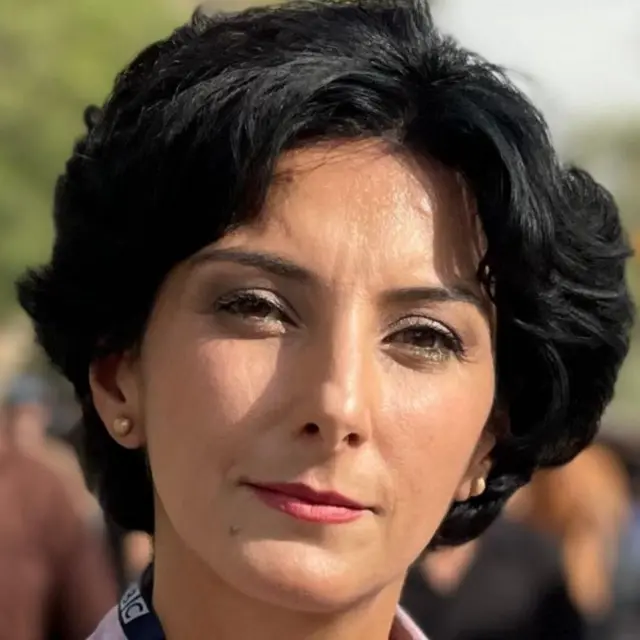 Nafiseh Kohnavard
Nafiseh Kohnavard
BBC Persian Middle East correspondent, in BeirutWe can bring you more reaction from southern Lebanon now, in the aftermath of Iran's attack on Israel.
Some, like Nada from Nabatieh in southern Lebanon, feel Iran’s attack will stop Israel’s plans to continue its ground invasion and airstrikes on southern Lebanon.
She fled her house with her family around two weeks ago.
“I think soon we will be able to go back to our home. In my opinion, now Israel knows what it should expect if it continues its aggression.”
I ask her: But what will happen if Israel attacks Iran?
“Israel wouldn’t dare. If it does, Iran will do more than what it did already.
"Iran can defend itself,” she tells me.
Her neighbour, Hanan, who sits next to her, disagrees: “I think the third world war has started and it will be devastating for everyone. We already lost our house and our leader is gone. But many more will lose their lives and houses too.”
Images capture aftermath of Beirut strikespublished at 21:28 British Summer Time
21:28 BSTWe've been bringing you updates across today on reports of clashes and cross-border exchanges between Israel and Hezbollah in Lebanon.
Over the course of the afternoon, pictures were sent to capturing the aftermath of Israeli strikes on Beirut's southern suburbs.
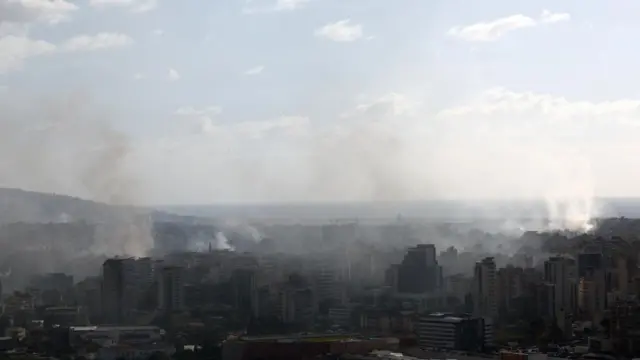 IMAGE SOURCE, REUTERS
IMAGE SOURCE, REUTERSImage caption, Smoke rising over the southern suburbs of Beirut
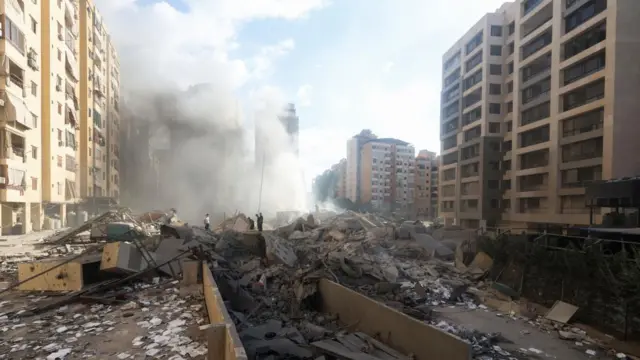 IMAGE SOURCE, REUTERS
IMAGE SOURCE, REUTERSImage caption, People stand amid the ruins caused by Israeli strikes in Chiyah, a southern suburb of Beirut
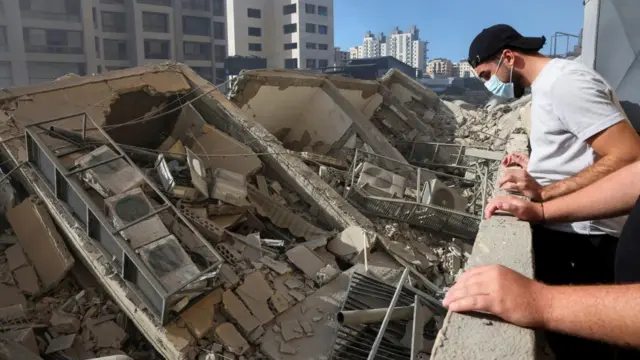 IMAGE SOURCE, REUTERS
IMAGE SOURCE, REUTERSImage caption, The aftermath of a strikes in Chiyah, a southern suburb of Beirut
The BBC's reporters on the ground were given a Hezbollah-organised tour of the area earlier on.
Tehran has 'deterrence' against possible Israeli retaliation - Iranian nuclear officialpublished at 21:13 British Summer Time
21:13 BSTGhoncheh Habibiazad
BBC MonitoringIranian armed forces have the “necessary deterrence” in the event of a possible Israeli retaliation on its nuclear sites, the head of Atomic Energy Organisation of Iran (AEOI) says.
Mohammad Eslami, downplayed the possibility of an Israeli attack on Iran's nuclear sites by saying that “Israel has always made such threats”.
As we mentioned earlier, US President Joe Biden said he does not support strikes on Iran's nuclear sites and made clear more sanctions would be imposed on Iran.
US supports Israeli retaliation after Iran attack - but still urging restraintpublished at 20:55 British Summer Time
20:55 BST Tom Bateman
Tom Bateman
Us State Department correspondent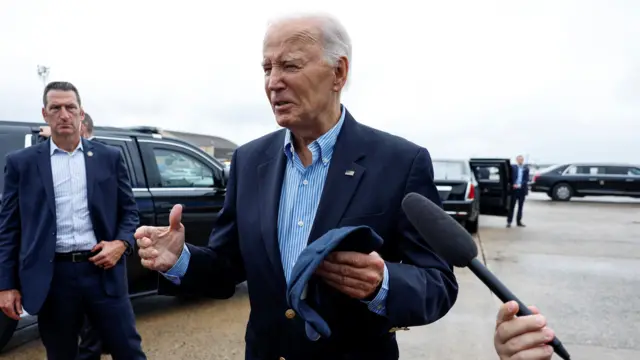 IMAGE SOURCE, REUTERS
IMAGE SOURCE, REUTERSWe’re getting a bit more of a sense of the way Washington is trying to steer Israel as it mulls the retaliation to Iran’s missile strikes.
The first point is it’s clear President Biden is telling the Israeli leadership that any attack on Iran’s nuclear facilities is off limits.
He was asked about it by reporters under the wing of Air Force One (on a trip to the hurricane-ravaged southeast US) - would the US would back any Israeli strike on Iran's nuclear sites?
Biden told them: "The answer is no.”
He also said he’d been talking to other world leaders on a G7 conference call adding that Israel should respond “proportionally". Biden also said more sanctions would be imposed on Iran.
Meanwhile, here at the US State Department, I’ve just come from a news briefing with the spokesman Matthew Miller.
We pressed him over what the US is saying to the Israelis, including calls from some Republicans in Washington for Israel to strike Iranian oil production facilities. Miller said it wasn’t appropriate for him to talk about ongoing discussions with the Israeli government.
But he added: “It’s clear that this was an unprecedented escalation by Iran. Israel has the right to respond to it. We’re having discussions about what that response will be”.
My sense so far is that the Israeli response is not immediately imminent, that the Americans support the retaliation but are still urging restraint - at least so far as to try to prevent a further Iranian counterattack.
Projectiles fired into Israel from Lebanon, IDF sayspublished at 20:32 British Summer Time
20:32 BSTIsrael’s military says 70 "projectiles" - without specifying what kind - have been fired into northern Israel from Lebanon over the last few hours.
They were fired at the Western Galilee area at around 17:45 local time (15:45 BST), and into Upper Galilee two hours later, it says.
Hezbollah says it has carried out missile attacks on Israeli military this afternoon and claims to have destroyed tanks and killed Israeli soldiers.
We've compiled a list of where Hezbollah says attacks happened:
- In Neve Ziv, northern Israel, it saysa drone attack targeted an artillery bunker at around 13:00 local time
- A missile strike hit Israeli forces between Odaisseh, Lebanon, and Masgav Am, Israel, the group says
- In Yaroun, Lebanon they sayIsraeli forces were hit with an explosive device at around 14:00 and again later in the afternoon
- The group say an explosive device detonated around Kfar Kila, Lebanon, with machine gun and rocket-propelled grenade attacks, causing “death and injuries”
- Abirim, Israel, was targeted with rockets while artillery and rockets hit Israeli forces near Metula, northern Israel
- The group says between Misgav Am and Kfar Giladi, Israel, a"rocket salvo" targeted Israeli forces
- In Maroun al-Ras, Lebanon, it says three Israeli tanks were destroyed with guided missiles
The IDF says all the "fallen projectiles" landed in open areas and has not confirmed Hezbollah’s reported attacks.
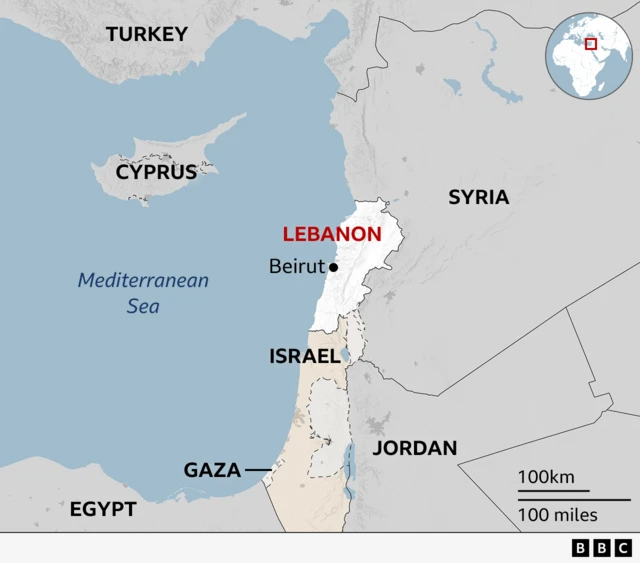
Watch: US Navy battleship fires interceptors at Iranian missilespublished at 20:20 British Summer Time
20:20 BSTVideo released by the US Navy shows the USS Bulkeley destroyer battleship firing interceptors targeting Iranian missiles heading towards Israel yesterday.
According to the US Naval Forces, the vessel has a weapons system designed for ballistic missile defence on board.
A spokesperson for the US Navy said "multiple missiles" are believed to have been successfully engaged.
Watch the clip below:
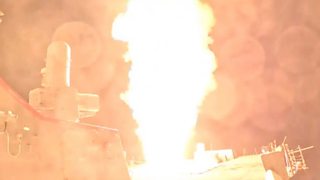
00:35 Media caption, Watch: Moment US Navy warship engages Iranian missile targeting Israel
Displaced Hezbollah supporters’ mixed feelings about Iran attackpublished at 20:01 British Summer Time
20:01 BST Nafiseh Kohnavard
Nafiseh Kohnavard
BBC Persian Middle East correspondent, in Beirut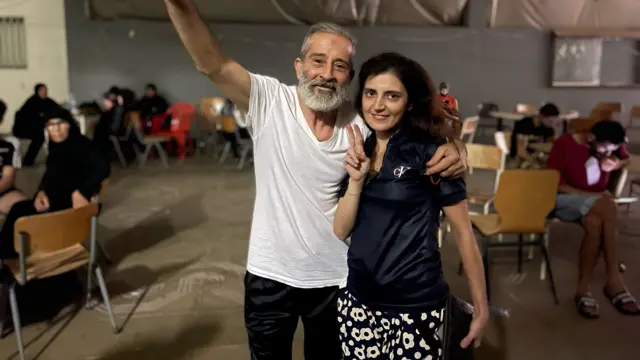
Image caption, Bell and Mohammed at the shelter
“I liked what Iran did, but I was waiting for it since the beginning the war. Not now,” says Bell, a 32-year-old Lebanese lawyer.
I met her at a school that's sheltering hundreds of people who fled from southern Lebanon and Dahieh, a suburb in the south of Beirut.
Bell had to leave her house in Haret Hreik, in Dahieh - an area that has been heavily bombed over the past few days.
“I think it is too late. We still can’t believe we have lost Seyyed Hasan,” she says.
Bell is talking about Hasan Nasrallah, the leader of Hezbollah, who was killed in an Israeli airstrike last Friday.
She tells me she feels “happy”, regardless.
And her uncle, Mohammad, says he is "proud of Iran".
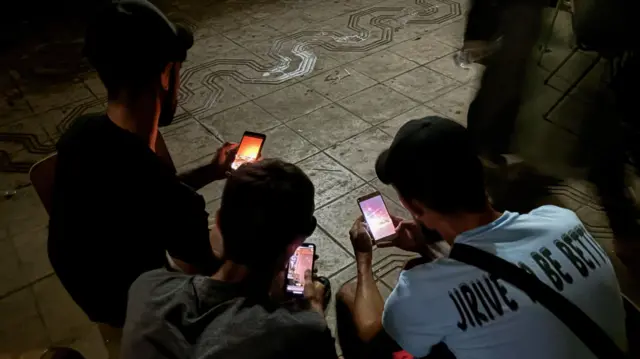
In the school at night, everyone is watching the news about developments following Iran’s attack on their phones.
Clearly, there are a mixed feelings here about Iran’s action.
“I will be happy when I see its actual results. If it is like their attack in April, it will mean nothing to us.
"A few ditches in some military bases without killing Israeli commanders or top leaders will be meaningless," Abu Ahmad tells me.
He also fled Dahieh, and says he and his brother's house were badly damaged in airstrikes.
Mapping the forces Israel is facingpublished at 19:30 British Summer Time
19:30 BSTThe Visual Journalism Team
BBC NewsIran’s missile attack on Israel is the latest escalation of the recent crisis that was initially sparked by the 7 October Hamas attacks.
Hamas sent gunmen across Gaza's border into Israel, killing about 1,200 people and taking about 250 others hostage.
Israel responded with a military campaign in Gaza that has now killed a total of 41,689 people, according to the health ministry.
Israel has also gone on the offensive against Hezbollahin Lebanon with airstrikes and a ground operation after almost a year of cross-border hostilities sparked by the war in Gaza.
It has inflicted a series of blows against the Iran-backed military and political organisation, including the killing of its leader Hassan Nasrallah on Friday. Hezbollah continues to fire rockets at northern Israel.
It has also been involved in aerial exchanges with Iranian-backed groups in Yemen, Iraq and Syria, and the Syrian military.
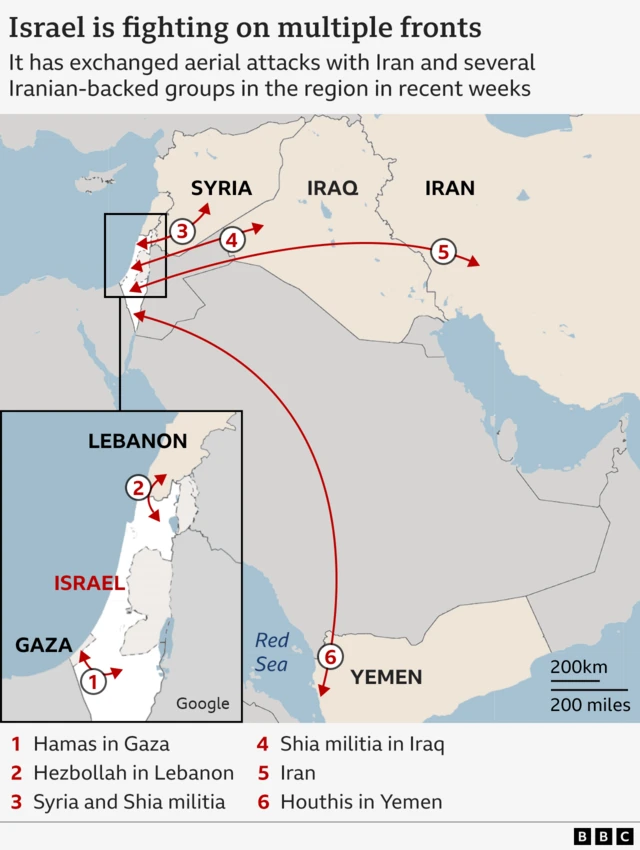
'Israel will stand together,' says Netanyahu after eight soldiers killedpublished at 19:13 British Summer Time
19:13 BST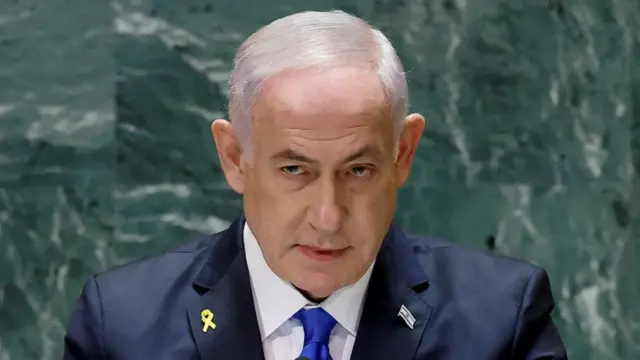 IMAGE SOURCE, REUTERS
IMAGE SOURCE, REUTERSIsraeli Prime Minister Benjamin Netanyahu says the country will "stand together" as he sends condolences to the families of the eight Israeli soldiers killed in Lebanon today.
In a post to X, Netanyahu says: "We are in the middle of a tough war against Iran's axis of evil, which seeks to destroy us. This will not happen - because we will stand together, and with God's help - we will win together."
He ends his message saying Israel will return abductees in the south, return residents to the north and will "guarantee the eternity of Israel".
Iran isn't looking for war, says President Massoud Pezeshkianpublished at 19:01 British Summer Time
19:01 BST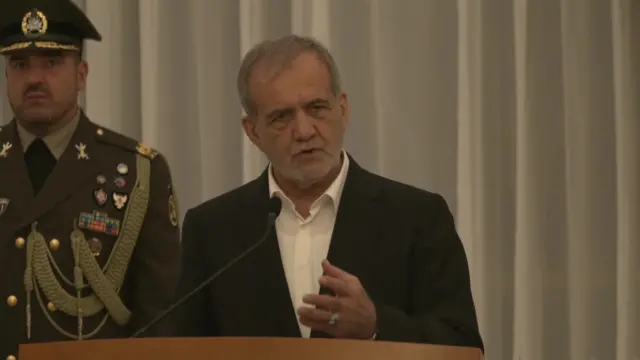 IMAGE SOURCE, REUTERS
IMAGE SOURCE, REUTERSIran is "not looking for war" but Israel is forcing them to react, Iranian President Massoud Pezeshkian says.
Speaking earlier at a press conference in Doha, Qatar, he warns Iran "will have a stronger response" if Israel retaliates to yesterday's strikes.
He says Israel's objective is to expand violence in the region and blames Israel for not wanting peace.
He goes on to stress that Iran wants to prevent and stop the violence.
Israeli military chief says IDF can strike anywhere in Middle Eastpublished at 18:50 British Summer Time
18:50 BST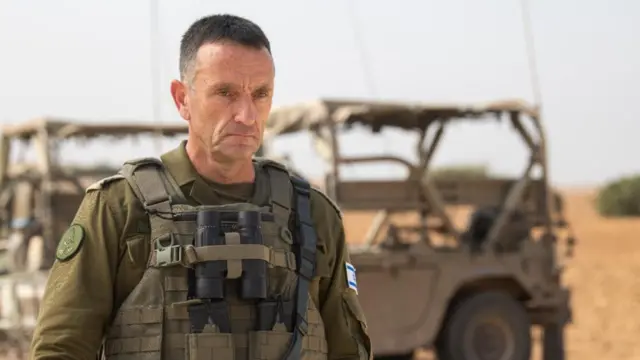 IMAGE SOURCE, IDF
IMAGE SOURCE, IDFThe head of the Israeli military, Lt Gen Herzi Halevi, has said the Israel Defence Forces have "the ability to reach and attack any point in the Middle East".
"And those of our enemies who have not understood this until now, will understand it soon."
Halevi made the remarks on a trip to the Tel Nof air base near Tel Aviv earlier.
"We will respond, we know how to locate important targets, we know how to strike with precision and power," he says in reference to Iran's strikes on Israel on Tuesday".
After noting Iran fired around 200 missiles at Israel yesterday, Halevi describes the damage from the barrage as "relatively minor".
Halevi also says the IDF is planning to "reinforce its forces" as it continues operations in the region.
Hamas says it carried out Tel Aviv shooting and knife attackpublished at 18:37 British Summer Time
18:37 BSTHamas’s armed wing, the al-Qassam Brigades, says it was behind a shooting and knife attack in Tel Aviv on Tuesday in which seven people were killed.
In a statement, the group says the men who carried it out were from the city of Hebron in the occupied West Bank.
Several people were also injured when a gunman opened fire at members of the public on Tuesday in the Jaffa area. Israeli police said the deadly "terror" attack took place in a rail carriage and continued on the platform.
Police said that the gunman and another attacker armed with a knife were "neutralised" by members of the public.
Biden says he does not support strikes on Iran's nuclear sitespublished at 18:22 British Summer Time
18:22 BST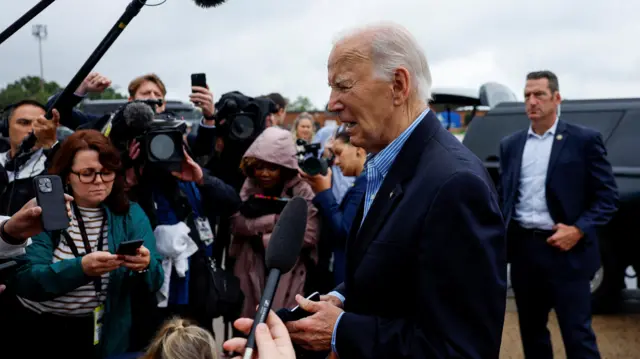 IMAGE SOURCE, REUTERS
IMAGE SOURCE, REUTERSJoe Biden has just told reporters that he does not support strikes on Iran's nuclear sites, in the aftermath of last night's missile attacks on Israel.
The US president also says he will be "discussing with Israelis what they're going to do", adding that all G7 allies agree any response must be proportional.
Biden also made clear that there would be more sanctions imposed on Iran.
Strikes were act of self defence - Iranian UN ambassador sayspublished at 18:12 British Summer Time
18:12 BSTIran's ambassador to the UN has told a Security Council meeting that the strikes on Israel were a direct response to "repeated acts of aggression against Iran".
Amir Saeed Iravani terms the strikes as "self defence".
He says Israel has become a "serious threat" to international security, going on to call for them to immediately cease the war on Gaza and halt attacks on Lebanon.
Earlier, we also heard Israel's ambassador Gilad Erdan call Iran's strikes an "assault on our very existence."
In Beirut, displaced families gather - with nowhere to gopublished at 17:54 British Summer Time
17:54 BST Hugo Bachega
Hugo Bachega
Middle East correspondent, in Beirut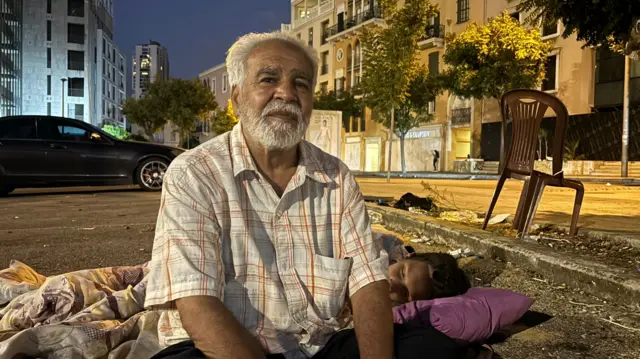
Image caption, Mohamed and his family have been unable to find a safe place to go
Lebanon’s Prime Minister Najib Mikati says about 1.2 million people have already been displaced by the conflict, as this crisis seems to be escalating.
People have been fleeing the hardest-hit areas, where Hezbollah has a strong presence: the south, the eastern Bekaa Valley and Dahieh, in Beirut’s southern suburbs.
The city’s Martyr’s Square has become a place where dozens of families have gathered, with nowhere to go.
Some tents have been set up near concrete walls, but many are sleeping on the steps of the nearby Mohammad Al Amin Mosque or on mattresses on the ground.
Mohamed, who is 55, arrived five days ago with his wife, his son and seven grandchildren, aged between 13 and two. They were trying to move to a shelter, he said, but had not been able to find a place.
“We’ve got nowhere to go,” he said. Thanks to donations, they have been able to eat; but are struggling without diapers, milk, and medicine.
Next to him, 26-year-old Mohamed had arrived with his three children, aged seven, five and four. He said he worked in Dahieh but, because all shops are closed, he lost his job.
“There’s no work,” he said, “all jobs are gone”.
Watch: BBC Verify analyses Iran's missile strikes on Israelpublished at 17:42 British Summer Time
17:42 BSTIran launched a missile attack on Israel on Tuesday night, hitting three key locations.
Most of the ballistic missiles were intercepted, according to the Israeli military.
This was Iran's second attack on Israel this year, after firing 300 missiles and drones in April.
BBC Verify's Nawal Al-Maghafi has analysed videos that emerged following the attack - and pinpoints three key locations that were targeted:

01:20 Media caption, Analysing where Iran's missiles struck in Israel
Three killed in Israel strike on Damascus, Syrian state media reportspublished at 17:30 British Summer Time
17:30 BSTThree people have been killed and three others wounded in an Israeli strike on a neighbourhood in western Damascus, Syrian state media reports.
The three-story residential building in the Syrian capital is in the same neighbourhood Israel already targeted on 30 September, in an attack that killing three civilians, according to state media.
The Syrian Observatory for Human Rights says it has recorded 93 Israeli strikes on Syrian territory since the beginning of 2024.
The BBC has reached out to the Israel Defense Forces (IDF) for comment.
In Tel Aviv, 'fear and panic' as Iran launched Tuesday attackpublished at 17:12 British Summer Time
17:12 BSTMollie Perella
BBC Newsbeat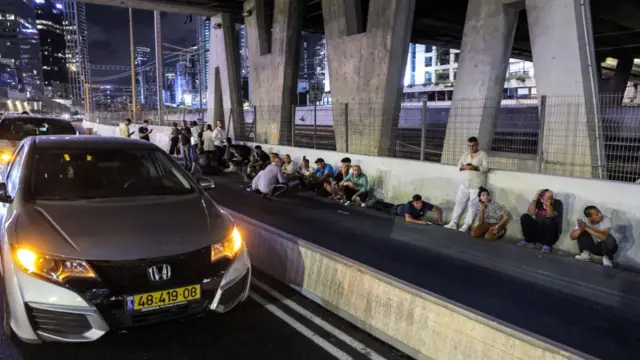 IMAGE SOURCE, GETTY IMAGES
IMAGE SOURCE, GETTY IMAGESImage caption, People taking cover under a bridge along the side of a road in Tel Aviv last night
Getting warnings about a possible attack is "sadly quite usual" for 25-year-old Marielle, who lives in Tel Aviv.
But when she got an alert to her phone after work on Tuesday - ahead of a massive missile attack launched by Iran - she knew this time was different.
“Usually we get 90 seconds,” she tells BBC Newsbeat. “This alert told us to shelter immediately."
“I was just scrambling. I was in the shower – my hair’s wet so I’m just grabbing everything, throwing on the first clothes I have and running to the shelter.”
The biggest feeling is “just fear and panic”, she says, as she sheltered with her roommate and other people in her building.
Marielle, who moved to Israel from the US three years ago, says attacks and threats are “a really insane reality I’ve had a hard time wrapping my head around”.
“It’s unfathomable to a lot of people how a rocket barrage like that could happen, terrorist attacks, and you’re just expected to carry on.”
The latest on Israel-Hezbollah clashespublished at 16:57 British Summer Time
16:57 BST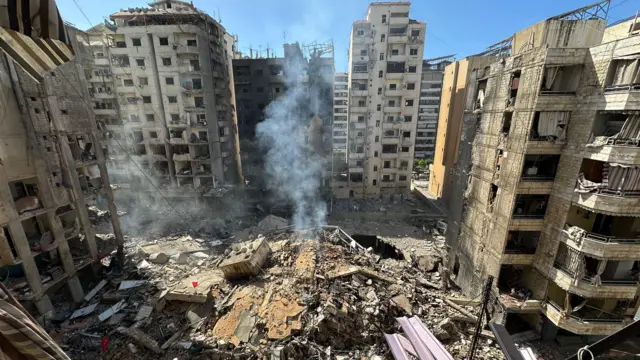 IMAGE SOURCE, EPA
IMAGE SOURCE, EPAImage caption, Damaged buildings following an overnight Israeli military strike in the southern suburbs of Beirut
- Clashes between Hezbollah and Israel are continuing with Israeli troops having reached 400 meters into Lebanon, the Lebanese military says
- The Israel Defense Forces announced the deaths of eight Israeli soldiers - the first inside Lebanon since the invasion began
- Meanwhile, Lebanon's state-run National News Agency (NNA) says six people were killed following an Israeli attack on the town of Aitaroun, southern Lebanon
- It earlier reported that three people were killed in an early morning Israeli strike on the village of Debel, close to the Israeli border
- A meeting of UN Security Council on the situation in the Middle East is currently under way. Secretary- General Antonio Guterres reiterated his call for a ceasefire, warning: "Time is running out"
- In Gaza, the Hamas-run health ministry says Israeli strikes in Khan Younis killed at least 51 people


Geen opmerkingen:
Een reactie posten